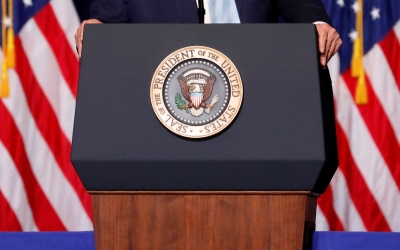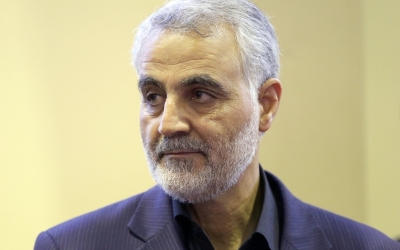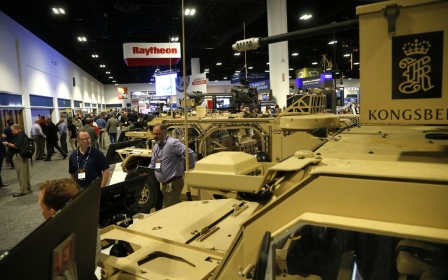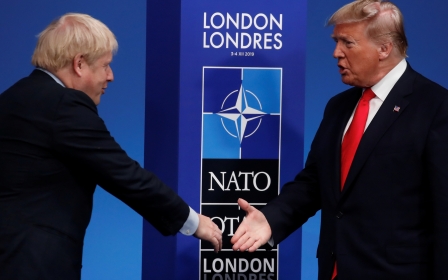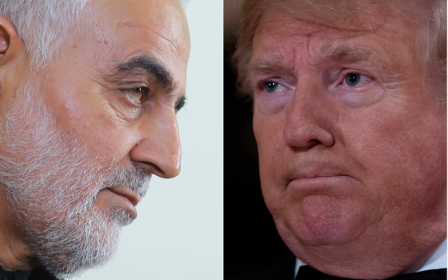As Trump intensifies Iran tensions, 2020 Democrats are rejecting war
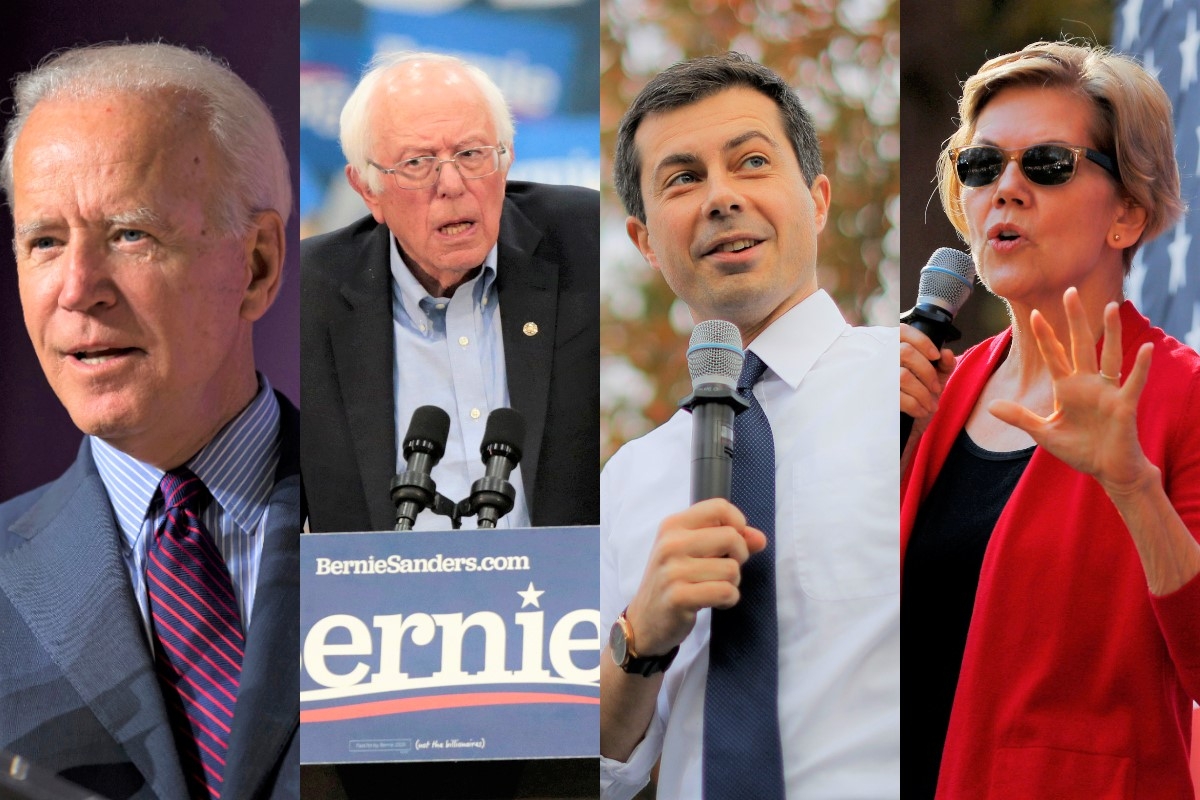
In the aftermath of the killing of Iranian general Qassem Soleimani, US President Donald Trump is seemingly set on military confrontation with Iran.
But with only one year left in his term, the US president who was impeached by the House of Representatives last month, may not be in the White House for long.
New MEE newsletter: Jerusalem Dispatch
Sign up to get the latest insights and analysis on Israel-Palestine, alongside Turkey Unpacked and other MEE newsletters
The Democratic candidates looking to unseat Trump in November have been vocal about Soleimani's killing, with many of them accusing the US president of inciting conflict with Tehran.
Several candidates also accused Trump of overstepping his authority by carrying out the strike without consulting with Congress.
Following the assassination, Washington is anticipating retaliatory attacks by Iran. And Trump has threatened to directly strike targets in the Islamic Republic if Americans are harmed.
Here's what the top Democratic presidential candidates had to say about Soleimani's assassination and the prospect of a war with Iran:
Bernie Sanders: Trump's actions put us on path to another war
Of all the candidates Senator Bernie Sanders has been the most outspoken against a possible war with Iran.
And unlike fellow 2020 Democrats who prefaced their criticism of Trump's policies with stating that Soleimani was a "terrorist", Sanders has not had much to say about the Iranian general himself.
Sanders, was also opposed the US-led invasion of Iraq in 2003, is now calling for action to stop Trump from getting the US into a war with Iran.
On Friday, he co-introduced legislation that would stop any Pentagon funds from being used to attack Iran without congressional authority.
The Vermont Senator had this to say to a group of supporters in Iowa on Friday:
"Trump promised to end endless wars. Tragically, his actions put us on a path to another war. Potentially one that could be even worse than before … The role of the United States, difficult as it may be, must be to work with the international community to end conflicts, to end the threat of war, not to promote war as President Trump is doing … Trump makes decisions impulsively, without explanation, and as in this case as in the past, without any congressional consultation. I believe that a key step in ending our endless wars is for Congress to reassert its constitutional authority over matters of war."
Joe Biden: A crisis of Trump's own making
As Barack Obama's vice president, Joe Biden was a part of the team that put together the Joint Comprehensive Plan of Action, the deal that saw Iran scale back its nuclear programme in exchange for lifting sanctions against its economy.
Trump abandoned the agreement in May 2018, paving the way for the tensions that culminated in Soleimani's assassination.
'The seeds of danger were planted by Trump himself on May the 8th, 2018'
- Former Vice President Joe Biden
Now Biden, a frontrunner for the Democratic nomination for president, is citing Trump's departure from the deal as a huge blunder.
"The seeds of danger were planted by Trump himself on May the 8th, 2018," Biden said in a televised speech on Tuesday, referencing the day Trump left the deal.
The former vice president called Trump "incompetent" over his decision to kill Soleimani.
On Soleimani, Biden acknowledged the damage done by the Iranian general across the region, but said Trump did not think the killing through.
He said this to say on Tuesday in a televised statement about the current tensions with Iran:
"Soleimani was responsible for the deaths of hundreds of American troops and thousands of innocent lives across the region. He was the mastermind, but he was not the hold of the regime, or of its capacity to strike back. So the question is, was the reward of removing a bad actor worth the risk of what comes next? We don't have evidence to suggest that Trump or anyone around him thought seriously about that."
Elizabeth Warren: We're here because of a reckless president
Massachusetts Senator Elizabeth Warren's initial response to the assassination was to label Soleimani as a "murderer, responsible for the deaths of thousands, including hundreds of Americans".
A day later, she took a different stance. Warren described Soleimani in a tweet as a senior foreign military figure and attacked Trump for ordering the general's assassination.
Then on Sunday, she only referred to Soleimani as a "government official, a high-ranking military official".
Yet all throughout, she rebuked Trump for increasing tensions with Iran and stoking the possibility of war.
Here is what she said in a series of tweets.
"We're on the brink of yet another war in the Middle East—one that would be devastating in terms of lives lost and resources wasted. We’re not here by accident. We're here because a reckless president, his allies, and his administration have spent years pushing us here."
"Donald Trump ripped up an Iran nuclear deal that was working. He’s repeatedly escalated tensions. Now he's assassinated a senior foreign military official. He’s been marching toward war with Iran since his first days in office—but the American people won’t stand for it."
Pete Buttigieg: My mind is with the troops moving to the Middle East
Southbend Mayor Pete Buttigieg has sought to assure voters he has what it takes to carry the US through such a test without appearing too hawkish against Iran.
While Buttigieg has served in the US military and was a Navy intelligence officer, he is the youngest candidate. As the mayor of a small Midwestern town, he has no foreign policy or national security experience as a politician.
This is what Buttigieg told MSNBC on the killing of Soleimani on Monday:
"There is no question that Soleimani had American blood on his hands, that he was a bad actor in the region. But if there is anything that we have learned in the last 20 years about the Middle East, it's that taking out a bad guy is not necessarily a good idea … There's no evidence that they've really thought about the consequences. My mind is with the troops who are moving to the Middle East. And having known what it's like to be inside one of those airplanes, you need to be able to trust that everybody up your chain of command has thought through what's ahead. And we're just not seeing a lot of indications of that."
Middle East Eye delivers independent and unrivalled coverage and analysis of the Middle East, North Africa and beyond. To learn more about republishing this content and the associated fees, please fill out this form. More about MEE can be found here.


